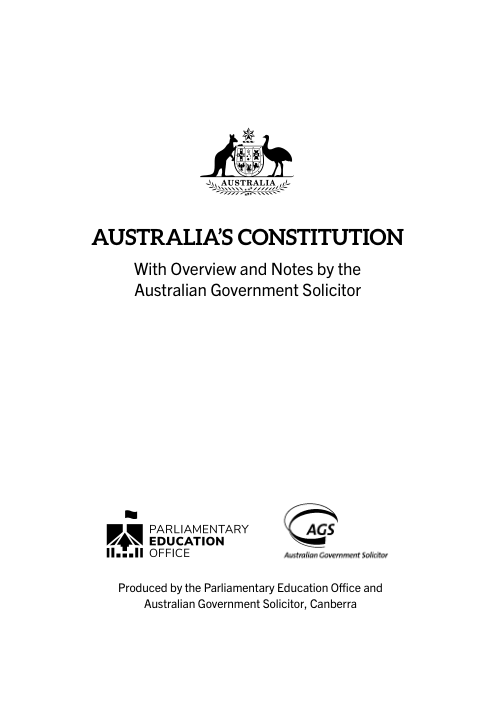# Australia's Constitution

## About
- Author: aph.gov.au
- Title: Australia's Constitution
- Tags: #articles #shortlist
- URL: https://www.aph.gov.au/-/media/05_About_Parliament/52_Sen/523_PPP/2023_Australian_Constitution.pdf?la=en&hash=D9117474455DBD5DDAA61E699329B64A598291C1
## Highlights
The Australian Constitution has properly been described as ‘the birth certificate of a nation’. It also provides the basic rules for the government of Australia. Indeed, the Constitution is the fundamental law of Australia binding everybody including the Commonwealth Parliament and the Parliament of each State. Accordingly, even an Act passed by a Parliament is invalid if it is contrary to the Constitution.
---
The Constitution establishes a federal system of government. It is for this reason that the establishment of the Commonwealth in 1901 is often referred to as ‘federation’. Under a federal system, powers are distributed between a central government and regional governments. In Australia, that distribution is between the Commonwealth and the six States. (The relationship between the Commonwealth and the Territories is discussed below.)
---
Section 57 prescribes the procedure for resolving any irreconcilable disagreement between the two Houses. That procedure essentially involves the dissolution of both Houses of Parliament by the Governor-General (that is, a ‘double dissolution’), the holding of an election for both the House of Representatives and the Senate, and then, if necessary, the convening of a joint sitting of the two Houses following the election to determine whether the proposed law or laws which led to the dissolution should be passed.
---
The Constitution confers the power to make laws on the Commonwealth Parliament. However, the power of the Commonwealth Parliament to make laws is limited to particular subjects. Most of these subjects are listed in sections 51 and 52. They include defence; external affairs; interstate and international trade; taxation; foreign, trading and financial corporations; marriage and divorce; immigration; bankruptcy; and interstate industrial conciliation and arbitration.
---
This list of powers given to the Commonwealth Parliament does not expressly refer to a number of important subjects including education, the environment, criminal law, and roads – but this does not mean that
those subjects are wholly outside the Parliament’s powers. For example, even though the Commonwealth Parliament has no specific power in relation to the environment, it can, under its external affairs power, prohibit the construction of a dam by a State if that is necessary to give effect to an international agreement on the environment.
---
Although the State Parliaments can pass laws on a wider range of subjects than the Commonwealth Parliament, the Commonwealth is generally regarded as the more powerful partner in the federation. One of the principal reasons for this is section 109 of the Constitution which provides that if a valid Commonwealth law is inconsistent with a law of a State Parliament, the Commonwealth law operates and the State law is invalid to the extent of the inconsistency.
---
Despite their importance to the operations of the Executive Government, neither the head of the Government (the Prime Minister) nor the principal decision-making body in the Government (the Cabinet, which is made up of senior Government Ministers) is mentioned in the Constitution.
- Note: This is wild! The constitution doesn't even specify that we need a prime minister.
---